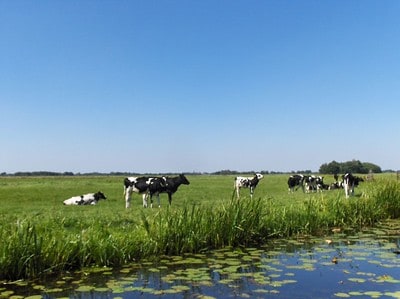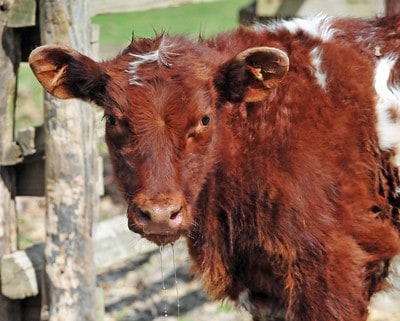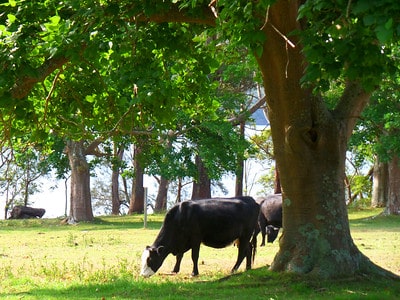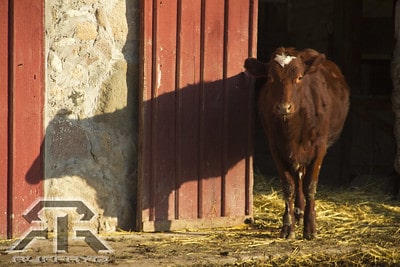Cows are hot-blooded animals that are difficult to raise due to their varying needs. Today, we will learn more about whether cows sweat.
Cows sweat when they get very hot. This usually happens during the summer months where their body temperature gets higher than normal. As it is, cows have a higher body temperature than humans, and it gets higher during summers and causes tremendous distress to the cattle. As such, they look for ways to cool themselves.
Key Takeaways:
| Topic | Summary |
|---|---|
| Why do cows sweat? | Cows sweat to dissipate heat and regulate their higher body temperature. |
| Where do cows sweat? | Cows sweat through their skin and coat but don’t typically appear drenched in sweat like horses. |
| Do cows have sweat glands? | Yes, cows have sweat glands in their hair follicles, but they are less effective at cooling compared to other animals. |
| How to tell if a cow is overheated? | Symptoms include elevated breathing, panting, drooling, fatigue, unbalanced walk, refusal to eat, and other signs of distress. |
| What is heat stress in cows? | Heat stress occurs when a cow’s body temperature rises significantly, leading to symptoms like reduced eating, weight loss, and respiratory issues. |
| How do cows cool down? | Cows cool down primarily through panting, as their sweat glands are not highly effective. Keeping them in a cooler environment helps. |
| How do cows regulate body temperature? | Cows reduce forage intake, drink water, and seek shade to regulate their body temperature. |
| What do cows do when they are hot? | When hot, cows act restlessly, pant excessively, drool, and may refuse to eat. They require cooling down in such situations. |
| How do cows keep cool in summer? | Keeping cows in the shade, providing water, and ensuring a suitable environment help them stay cool during hot weather. |
| What temperature can cows tolerate? | Cows can tolerate temperatures between 40 to 60 degrees Fahrenheit. Temperatures above 80 degrees can lead to heat stress. |
| How do dairy cows keep cool? | Dairy cows pant, seek shade, and may benefit from fans and misters to prevent heat-related issues, which can affect milk production. |
| How to cool down a cow immediately? | Quick cooling methods include spraying water, misting, providing shade, offering water, and using fans. These actions help dissipate heat. |
There is a lot of speculation regarding cows and whether they sweat like other animals. Let us look at some commonly asked questions about cows and how they can stay cool.

Image Credits: “Dutch landscape with cows” by eessam is licensed under CC BY 2.0
Why do cows sweat?
Humans sweat to evaporate heat from their bodies and cool down. But why do cows sweat? Let’s find out.
Cows sweat to cool themselves down and control their body temperature. As you might already know, cows are warm-blooded animals with a body temperature that is much higher than that of humans. Consequently, sweating is one of the best ways for them to dissipate heat from their body and avoid overheating.
Heat can be detrimental to a cow’s health, and therefore, it is essential for them to cool themselves down and be in a suitable environment, with a water source nearby.
Where do cows sweat?
Sweating is one of the best ways in which cows can prevent overheating and control their body temperatures. Let’s find out where cows sweat.
Cows have sweat glands on their skin and sweat through different body parts, even their nose. Cows primarily sweat through their coat, but you will never see them drenched in sweat like horses. In fact, sometimes, cows sweat very little and, as such, need other ways to cool themselves down.
Radiating heat from their body is of utmost importance to a cow, especially if they live in areas where the temperatures get very high.
Do cows have sweat glands?
Most animals, like human beings, have sweat glands. Let’s explore whether cows have sweat glands or not.
Cows have sweat glands present. Each of their hair follicles has an accompanying sweat gland. These are called apocrine glands and help reduce the temperature of the cow’s body. That being said, these sweat glands are more effective in hoofed animals and often prove to be ineffective in cooling the cows down.
There has been a lot of scientific research on the cow’s sweat glands and how it doesn’t work to their full potential. The bottom line is that apocrine glands work better for sheep and horses than cows.
How do you tell if a cow is overheated?
Cows have sweat glands over their body to help dissipate heat. But do they get overheated? Let’s find out.
Cows get overheated because the sweat glands on their body are not quite effective in dissipating heat properly. Since cows are warm-blooded animals, they accumulate a lot of heat. If they do not get sufficient cooling time due to environmental conditions, they get overheated.
Often, cows end up accumulating more heat than they can dissipate, especially during peak summer months. In such cases, it is best to look for alternate ways to help the cow cool down.
What is heat stress in cows?
You might have often heard the word ‘heat stress’ in connection to cattle. Let’s explore more about what it is.
Heat stress happens when a cow’s body temperature rises so high (80 degrees F or more) that it becomes difficult for it to function normally. Most often, this happens during the summer months, and cows begin to experience dangerous symptoms, and if not treated or cooled immediately, it can be fatal for the animal.
Due to heat stress, cows may eat less, lose weight at a rapid pace, and experience respiratory issues. Cows with a thick coat, young cows, or the ones who are unhealthy are likely to suffer more than normal cows.
How to tell if a cow is overheated?

Image Credits: “Slobbering calf” by warriorwoman531 is licensed under CC BY-ND 2.0
There are several ways to identify a cow who is overheated. Let’s check it out.
Overheating is a major problem in cows, and you should consult a vet if you see any of these symptoms:
- Elevated breathing and restlessness.
- Panting along with elevated drooling.
- Elevated breathing along with drooling and foaming.
- Sudden fatigue.
- Unbalanced walk.
- Refusal to eat food and standing continuously.
- Continuously breathing with mouth open and tongue protruding.
- Reduced respiration rate and keeping the head down.
Early detection of symptoms makes quick treatment possible. Cooling down your cattle is of utmost importance; otherwise, heat stress may be fatal.
What does it mean when a cow drools?
There are several reasons why a cow can be drooling. Allow us to tell you more in this regard.
Cows drool when they’re hungry, but there are other reasons too. If your cow is drooling excessively but not eating, it can be a symptom of it suffering from heat stress or some other issue. Alternatively, young cows drool when they’re teething, and some cows drool due to mouth lesions.
Remember, it is absolutely normal for a cow to drool moderately throughout the day. But drooling accompanied by foaming and refusal to eat can be quite dangerous, and you should immediately consult a vet.
How do cows cool down?

Image Credits: “Peaceful breakfast” by jo.elphick is marked with CC0 1.0
There are certain ways cows can cool down when they get overheated. Let’s learn more about this.
Cows cool down through excessive breathing. Their options are very limited since their sweat glands are not as functional. As such, even though they try cooling down by radiating heat, it doesn’t work effectively. As a result, most cows reduce their forage intake, which leads to a decline in their energy levels.
Although panting is a good self-preservation method for cows, it is essential for the farmers to keep them in a cooler environment, especially during summers. This helps them stay cool and keeps their energy levels stable.
How do cows regulate their body temperature?
Cows can self-regulate their body temperature in different ways. Let us learn more about this.
Cows regulate their body temperature by reducing their forage intake during the summer months. In addition, they drink plenty of water and look for shade wherever it is available. Cows sweat during summers too, but since their sweat glands are underactive, breathing is one of the best ways to cool themselves down.
It is essential for cows to cool down properly since overheating can lead to several problems and make them uncomfortable.
What do cows do when they are hot?
Cows react in different ways when they get hot. Allow us to tell you more about what they do when hot.
Cows act very restlessly when they’re hot. They keep standing, even when others in their herd are sitting down. In addition, you will notice excessive panting, an indifference to food when they should be eating, foaming, and drooling. The biggest indication of a cow being overheated is its refusal to eat.
It is essential to know how cows act when they are hot. It helps you take quick action and allow them to cool down when they are restless.
How do cows keep cool in summer?
Over time, cows learn how to cool themselves in summer. Let’s check out how cows keep cool.
Are cows okay in the heat?

Cows are adaptable animals that usually adjust to different environmental settings. But are they okay in the heat? Let’s find out.
Cows are very sensitive to heat and are not okay in hot weather. They react to heat in different ways. Most cows stop eating, and this reduces their energy levels and lactating potential. It is important to prevent cows from being overheated, and as such, most farmers keep cows in the shade during hot weather.
Keeping cows in the shade during warm weather and ensuring they drink plenty of water is one of the best ways to keep them cool in scorching temperatures.
What temperature can cows tolerate?
Cows are warm-blooded animals that can tolerate up to a certain temperature before they get overheated and start acting out. Let’s learn more about this.
Cows can tolerate temperatures around 40 to 60 degrees Fahrenheit. Temperatures that go above 80 degrees Fahrenheit can become extremely uncomfortable for cows and pose the risk of them experiencing heat stress. Since the average body temperature of cows is 102 degrees, they prefer colder environments.
That being said, excessive cold can also be detrimental to the cow’s health. Although cattle are better at adapting to colder temperatures, they also experience cold stress during abnormally cold temperatures.
How do dairy cows keep cool?
Dairy cows need to be cool, especially when they’re lactating. Let’s check out how they keep cool.
Dairy cows keep cool by panting or by looking for shade during hot summer months. Farmers install fans in the barnyard to ensure the cows do not get overheated. If dairy cows feel hot, they stop eating food properly, which hampers their lactating potential. Therefore, farmers use misters and fans to keep the cows cool.
Fans, water, and shade are the perfect combination that can keep a cow cool. As such, it is important to keep the cow in a proper, cool area where there is plenty of shade and water nearby.
How to cool down a cow immediately?
In cases of emergency, you will need to take quick action and cool down the cow. Let’s see how.
To cool down a cow quickly, you should spray water over them. Misting or fogging allows heat to dissipate via the process of evaporation and cools down the cow. Alternatively, take them to a shaded area, allow them to drink plenty of water, or switch on a heavy-duty fan.
That being said, shade might not be available everywhere, and therefore, sprinkling water is the best solution. Some farmers also install fans in the barn to cool their cows.
Conclusion
Cows sweat, just like any other animal. However, if they are overheated, it can get quite serious for them and pose a major health risk. Although they have sweat glands, evaporation doesn’t work for them as easily as it does for humans.
As such, the golden combination for cooling the cows is plenty of water, shade, and sufficient fans.




